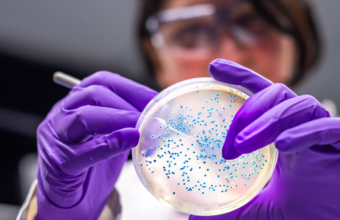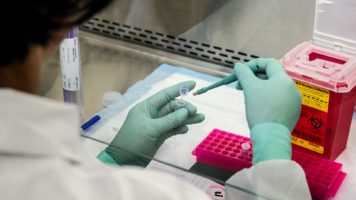COVID-19 News
COVID-19 Update | April 15, 2022
April 15, 2022

The California Biotechnology Foundation is committed to keeping you up to date about COVID-19 testing, treatment and prevention advancements. The following resources track what progress has been made as of April 15, 2022. Notable advancements include:
- Pfizer-BioNTech’s COVID-19 vaccine booster shot significantly increased antibodies levels in children ages 5 to 11.
- Moderna is seeking FDA approval for its COVID-19 vaccine to protect children younger than 6-years-old.
- Veru Inc.’s new COVID-19 treatment, sabizabulin, halved the death rate among critically ill COVID-19 patients receiving supplemental oxygen and at high risk for serious lung disease and death.
Recent News
- The F.D.A. authorizes the first COVID-19 breath test.
New York Times – April 15, 2022
The Food and Drug Administration granted emergency use authorization to the first Covid-19 test that can detect the COVID-19 in a breath sample, within a few minutes and with a high degree of accuracy. “Today’s authorization is yet another example of the rapid innovation occurring with diagnostic tests for COVID-19,” Jeff Shuren, the director of the F.D.A.’s Center for Devices and Radiological Health, said in a statement. - Pfizer says booster in children 5-11 raises antibodies against Omicron
NBC News – April 14, 2022
A booster dose of the Pfizer-BioNTech COVID-19 vaccine raised antibody levels in children ages 5 to 11. The additional shot, given six months after the two-dose primary series, led to a sixfold increase in antibodies against the original strain of COVID-19. The clinical trial of the booster shot included 140 children ages 5 through 11. In a smaller sub-analysis of 30 kids in the trial, Pfizer said the additional dose led to a thirtysixfold increase in antibodies against the omicron variant of the virus. - Already got COVID-19? Vaccines, boosters up to 68% effective against hospitalization from reinfection, CDC study shows
USA Today – April 14, 2022
Immunity from a bout of COVID-19 may provide some protection against the virus, but a new study suggests it may not be enough to keep you out of the hospital. The Centers for Disease Control and Prevention partnered with Epic Research, which shares data to advance medicine and public health, to determine how effective vaccines and boosters are against hospitalization from reinfection. Researchers looked at electronic health records from over 50,000 patients during both the delta and omicron waves who tested positive for COVID-19 more than three months after a previous infection. - This Could Be Our Fastest, Most Sensitive COVID-19 Test Yet
The Daily Beast – April 13, 2022
A group of researchers in the U.K. are fixing to change that by harnessing the power of nanoparticles. In a new study published April 13 in the journal Sensors, researchers at Newcastle University created a COVID-19 test that uses a synthetic antibody called molecularly imprinted polymer nanoparticles (or nanoMIPs) could detect even the tiniest amounts of viral antigens as fast as most off-the-shelf rapid antigen tests currently available. It could be a huge boon to helping people identify early COVID-19 infections and reduce the impact of nascent outbreaks that will continue to pop up over time. - An experimental COVID-19 drug was so successful that they’re shutting down trials early
Fortune – April 12, 2022
A new drug could be a godsend for patients hospitalized with COVID-19 and help save the most critical cases. A double-blind study that ended last week showed that sabizabulin, a new oral medication from pharmaceutical company Veru has the potential to cut the virus’s mortality rate in half for moderate and severe cases. It was so successful, in fact, that researchers stopped the trial early. “What that implies is that it’s unethical to continue treating people with placebo,” Mitchell Steiner, chairman, president, and CEO of Veru, told Fortune. - COVID-19 Vaccines Carry Low Risk of Heart Conditions, Studies Find
Wall Street Journal – April 11, 2022
The risk of developing inflammatory heart conditions after COVID-19 vaccination is relatively low, two large studies found, especially when compared with the heart-related risks from COVID-19 disease itself and from vaccines against other diseases. One study, an analysis of 22 previous studies, found that the risk of the conditions including myocarditis in people who received a COVID-19 vaccine wasn’t significantly different from that for non-COVID-19 vaccines such as those against flu, polio and measles. And the heart risk associated with COVID-19 shots was lower than the risk after smallpox vaccination. - Moderna seeks FDA approval on COVID-19 vaccine for young children
ABC 10 – April 11, 2022
Moderna is seeking FDA approval for its COVID-19 vaccine aimed to protect children younger than 6-years-old. Its clinical trial tested 1/4 of the adult dose in children between 6 months and 6-years-old. ABC10 Health Expert Dr. Payal Kohli said the two doses given four weeks apart show an immune response. The protection against the omicron variant is about 38% to 44% in symptomatic cases. She said it is likely children will need a booster as well. “A lot of parents might say, well, it’s only 40%,’ should I still get my kids vaccinated?’ There’s a resounding yes to that because it was very safe and well-tolerated. There were no cases at all of myocarditis or inflammation of the heart muscle which we worry about. Kids just had normal side effects such as fever,” Kohli said. - New COVID-19 Treatment Slashed Deaths Among Patients With Severe COVID-19, Maker Claims
New York Times – April 11, 2022
A new COVID-19 treatment halved the death rate among critically ill COVID-19 patients who were receiving supplemental oxygen and were at high risk for serious lung disease and death, the drug’s developer announced. There is a pressing need for new treatments for critically ill patients. Drugs like Paxlovid, made by Pfizer, are aimed primarily at patients who have mild or moderate disease. Other treatments administered to hospitalized patients in serious condition have shown limited effectiveness. The new drug, sabizabulin, reduced deaths among hospitalized COVID-19 patients so drastically in a clinical trial that independent safety monitors recommended stopping it early. - The next leap in COVID-19 vaccine development could be a nasal spray
Washington Post – April 10, 2022
As the omicron variant of the COVID-19 moved lightning-fast around the world, it revealed an unsettling truth. The virus had gained a stunning ability to infect people, jumping from one person’s nose to the next. Cases soared this winter, even among vaccinated people. That is leading scientists to rethink their strategy about the best way to fight future variants, by aiming for a higher level of protection: blocking infections altogether. If they succeed, the next vaccine could be a nasal spray. The original COVID-19 shots proved remarkably versatile, protecting people from the worst outcomes of COVID-19. But as experts debate when, whether and who should receive additional boosters, a growing number of scientists are beginning to think additional shots could have marginal benefits for most healthy people.
Rely on California Biotechnology Foundation to monitor breaking news and provide updates on the latest advancements in COVID-19 diagnostics, vaccines and treatments.
Stay informed on the latest news and trends on the economic and health benefits of this industry by visiting the new CABiotech.org
If you have any questions about informational briefings contact California Biotechnology Foundation Executive Director Patty Cooper at (916)764-2434 or [email protected].


